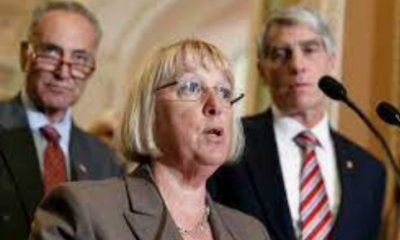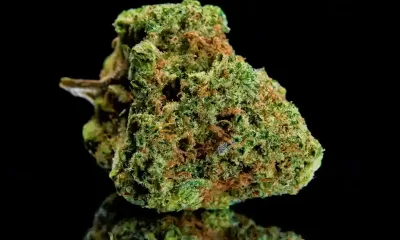Business
New Analysis of SAFE Banking Act Asks for 10 Amendments to Improve Equity

Former cannabis regulators release an extensive analysis describing the problems with the SAFE Banking Act, and how to improve it.
A paper written by the Cannabis Regulators of Color Coalition (CRCC) was published by the Ohio State University Moritz College of Law on Aug. 12. The paper, entitled “Not a SAFE Bet: Equitable Access to Cannabis Banking, An Analysis of the SAFE Banking Act,” analyzes the Safe and Fair Enforcement Banking Act (SAFE), and includes numerous recommendations for improvement.
Authors Cat Packer, Shaleen Title, Rafi Aliya Crockett, and Dasheeda Dawson state that the SAFE Banking Act isn’t enough in its current form. “But unfortunately, SAFE, as written, is unlikely to result in equitable access to financial services,” they wrote in the study abstract. “This paper summarizes the bill, analyzes why it would fall short of its purported goals, and makes recommendations to improve the bill.”
“SAFE would address only the legal and regulatory consequences potentially faced by financial institutions for providing services to the cannabis industry,” the authors wrote in their executive summary. “Without additional legislative amendments to directly address challenges related to fair and equitable access to financial services, small and minority-owned cannabis businesses that currently have inadequate access to banking services or loans are likely to continue to be denied the full breadth and depth of services offered to others.”
The authors compiled 10 recommendations that could help improve future reform of cannabis banking (check out the full explanation for each recommendation here.) In summary, these recommendations cover a thorough collection of topics of improvement, such as redirecting Internal Revenue Service code 280E funds, expanding requirements for anti-discrimination laws, identifying best practices for federal banking regulators, and much more.
The authors concluded that although a cannabis policy gap has developed, now is the time to address these concerns. “The continued criminalization of cannabis at the federal level, coupled with an increasing number of states authorizing medical or adult-use cannabis activity, has resulted in an ever-widening policy gap between federal and state cannabis laws,” the authors said. “However, due to cannabis’s widely accepted medical use, existing state and local efforts to authorize, license and regulate cannabis for medical and adult-use, and bipartisan support from the American public regarding cannabis legalization, many believe that it is no longer a matter of ‘if’ or ‘when’ this gap will be addressed, but ‘how’.”
Ultimately, the CRCC authors don’t recommend the SAFE Banking Act in its current form unless these topics are discussed. “As such, regardless of whether Congress decides to pass cannabis banking reform as a part of more comprehensive cannabis policy reform or as a standalone issue, Congress should ensure that any legislation related to cannabis banking reform includes explicit provisions that seek to ensure fair and equitable access to financial services for all in the cannabis industry. Until the SAFE Banking Act is amended to include such provisions it should not be considered a safe bet to achieve equity in cannabis banking.”
The release of this paper, along with these 10 recommendations, arrives nearly one month after Senate Majority Leader Chuck Schumer, Senate Finance Committee Chairman Ron Wyden, and Sen. Cory Booker filed the Cannabis Administration and Opportunity Act in July. Reports predict that compromises could be made, with the possible release of a bill being referred to as “SAFE Banking Plus.”
On Wednesday, Aug. 17, the CRCC is holding a Cannabis Regulatory Deep Dive to discuss this analysis with all four author contributors, as well as Maritza Perez, Director of the Office of Federal Affairs at the Drug Policy Alliance, who will moderate the meeting. The event will be held via Zoom at 12 p.m. ET.
Business
New Mexico cannabis operator fined, loses license for alleged BioTrack fraud

New Mexico regulators fined a cannabis operator nearly $300,000 and revoked its license after the company allegedly created fake reports in the state’s traceability software.
The New Mexico Cannabis Control Division (CCD) accused marijuana manufacturer and retailer Golden Roots of 11 violations, according to Albuquerque Business First.
Golden Roots operates the The Cannabis Revolution Dispensary.
The majority of the violations are related to the Albuquerque company’s improper use of BioTrack, which has been New Mexico’s track-and-trace vendor since 2015.
The CCD alleges Golden Roots reported marijuana production only two months after it had received its vertically integrated license, according to Albuquerque Business First.
Because cannabis takes longer than two months to be cultivated, the CCD was suspicious of the report.
After inspecting the company’s premises, the CCD alleged Golden Roots reported cultivation, transportation and sales in BioTrack but wasn’t able to provide officers who inspected the site evidence that the operator was cultivating cannabis.
In April, the CCD revoked Golden Roots’ license and issued a $10,000 fine, according to the news outlet.
The company requested a hearing, which the regulator scheduled for Sept. 1.
At the hearing, the CCD testified that the company’s dried-cannabis weights in BioTrack were suspicious because they didn’t seem to accurately reflect how much weight marijuana loses as it dries.
Company employees also poorly accounted for why they were making adjustments in the system of up to 24 pounds of cannabis, making comments such as “bad” or “mistake” in the software, Albuquerque Business First reported.
Golden Roots was fined $298,972.05 – the amount regulators allege the company made selling products that weren’t properly accounted for in BioTrack.
The CCD has been cracking down on cannabis operators accused of selling products procured from out-of-state or not grown legally:
- Regulators alleged in August that Albuquerque dispensary Sawmill Sweet Leaf sold out-of-state products and didn’t have a license for extraction.
- Paradise Exotics Distro lost its license in July after regulators alleged the company sold products made in California.
Golden Roots was the first alleged rulebreaker in New Mexico to be asked to pay a large fine.
Source: https://mjbizdaily.com/new-mexico-cannabis-operator-fined-loses-license-for-alleged-biotrack-fraud/
Business
Marijuana companies suing US attorney general in federal prohibition challenge

Four marijuana companies, including a multistate operator, have filed a lawsuit against U.S. Attorney General Merrick Garland in which they allege the federal MJ prohibition under the Controlled Substances Act is no longer constitutional.
According to the complaint, filed Thursday in U.S. District Court in Massachusetts, retailer Canna Provisions, Treevit delivery service CEO Gyasi Sellers, cultivator Wiseacre Farm and MSO Verano Holdings Corp. are all harmed by “the federal government’s unconstitutional ban on cultivating, manufacturing, distributing, or possessing intrastate marijuana.”
Verano is headquartered in Chicago but has operations in Massachusetts; the other three operators are based in Massachusetts.
The lawsuit seeks a ruling that the “Controlled Substances Act is unconstitutional as applied to the intrastate cultivation, manufacture, possession, and distribution of marijuana pursuant to state law.”
The companies want the case to go before the U.S. Supreme Court.
They hired prominent law firm Boies Schiller Flexner to represent them.
The New York-based firm’s principal is David Boies, whose former clients include Microsoft, former presidential candidate Al Gore and Elizabeth Holmes’ disgraced startup Theranos.
Similar challenges to the federal Controlled Substances Act (CSA) have failed.
One such challenge led to a landmark Supreme Court decision in 2005.
In Gonzalez vs. Raich, the highest court in the United States ruled in a 6-3 decision that the commerce clause of the U.S. Constitution gave Congress the power to outlaw marijuana federally, even though state laws allow the cultivation and sale of cannabis.
In the 18 years since that ruling, 23 states and the District of Columbia have legalized adult-use marijuana and the federal government has allowed a multibillion-dollar cannabis industry to thrive.
Since both Congress and the U.S. Department of Justice, currently headed by Garland, have declined to intervene in state-licensed marijuana markets, the key facts that led to the Supreme Court’s 2005 ruling “no longer apply,” Boies said in a statement Thursday.
“The Supreme Court has since made clear that the federal government lacks the authority to regulate purely intrastate commerce,” Boies said.
“Moreover, the facts on which those precedents are based are no longer true.”
Verano President Darren Weiss said in a statement the company is “prepared to bring this case all the way to the Supreme Court in order to align federal law with how Congress has acted for years.”
While the Biden administration’s push to reschedule marijuana would help solve marijuana operators’ federal tax woes, neither rescheduling nor modest Congressional reforms such as the SAFER Banking Act “solve the fundamental issue,” Weiss added.
“The application of the CSA to lawful state-run cannabis business is an unconstitutional overreach on state sovereignty that has led to decades of harm, failed businesses, lost jobs, and unsafe working conditions.”
Business
Alabama to make another attempt Dec. 1 to award medical cannabis licenses

Alabama regulators are targeting Dec. 1 to award the first batch of medical cannabis business licenses after the agency’s first two attempts were scrapped because of scoring errors and litigation.
The first licenses will be awarded to individual cultivators, delivery providers, processors, dispensaries and state testing labs, according to the Alabama Medical Cannabis Commission (AMCC).
Then, on Dec. 12, the AMCC will award licenses for vertically integrated operations, a designation set primarily for multistate operators.
Licenses are expected to be handed out 28 days after they have been awarded, so MMJ production could begin in early January, according to the Alabama Daily News.
That means MMJ products could be available for patients around early March, an AMCC spokesperson told the media outlet.
Regulators initially awarded 21 business licenses in June, only to void them after applicants alleged inconsistencies with how the applications were scored.
Then, in August, the state awarded 24 different licenses – 19 went to June recipients – only to reverse themselves again and scratch those licenses after spurned applicants filed lawsuits.
A state judge dismissed a lawsuit filed by Chicago-based MSO Verano Holdings Corp., but another lawsuit is pending.
Source: https://mjbizdaily.com/alabama-plans-to-award-medical-cannabis-licenses-dec-1/
-

 Business2 years ago
Business2 years agoPot Odor Does Not Justify Probable Cause for Vehicle Searches, Minnesota Court Affirms
-

 Business2 years ago
Business2 years agoNew Mexico cannabis operator fined, loses license for alleged BioTrack fraud
-

 Business2 years ago
Business2 years agoAlabama to make another attempt Dec. 1 to award medical cannabis licenses
-

 Business2 years ago
Business2 years agoWashington State Pays Out $9.4 Million in Refunds Relating to Drug Convictions
-

 Business2 years ago
Business2 years agoMarijuana companies suing US attorney general in federal prohibition challenge
-

 Business2 years ago
Business2 years agoLegal Marijuana Handed A Nothing Burger From NY State
-

 Business2 years ago
Business2 years agoCan Cannabis Help Seasonal Depression
-

 Blogs2 years ago
Blogs2 years agoCannabis Art Is Flourishing On Etsy













